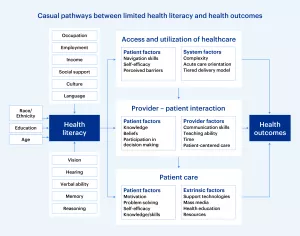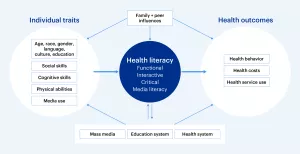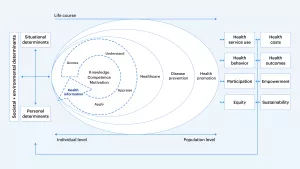Bickmore TW, Ólafsson S, O'Leary TK. Mitigating Patient and Consumer Safety Risks When Using Conversational Assistants for Medical Information: Exploratory Mixed Methods Experiment J Med Internet Res 2021;23(11):e30704.
Read More
Holland N. A Historical Overview of Language Access in Dentistry: The Impact of Language Access Protections on Oral Health Care Journal of the California Dental Association. 2021; 49(12):749-757).
Read More
Kurtz-Rossi S, Okonkwo IA, Chen Y, Duenas N, Bilodeau T, Rushforth A, and Klein A. Development of a new tool for writing research key information in plain language. HLRP, 2024:8(1):e29-e37.
Read More
Paasche-Orlow, MK, Parker RM, Gazmararian JA, Nielsen-Bohlman LT, and Rudd RR. The Prevalence of Limited Health Literacy. J Gen Intern Med, 2005;(20):175-184.
Read More
Paasche-Orlow MK. Health Communication: Not just Autonomy, Also Justice. The American Journal of Bioethics. 2017;17(11):49.
Read More
Paasche-Orlow MK, Schillinger D, Weiss BD, Bickmore T, Cabral H, Chang P, Bailey SC, Dewalt DA, Fernandez A, Fransen M, Leung A, McCaffery K, Meade CD, McCormack LA, Protheroe J, Parker R, Rothman R, Rubin D, Rudd R, Sørensen K, Von Wagner C, Wolf MS, Yin HS, Ownby RL. Health Literacy and Power. Health Lit Res Pract. 2018;15;2(3):e132-e133.
Read More
Quintiliani LM, Kamaka M, Henault L, Antonio MCK, Sentell T, Spencer K, Akaka G, Honda LK, Hanakeawe D, Dillard A, Kekauoha BP, Davis AD, Seitz R, Cabral HJ, Volandes A, Mala Mau MKL, Paasche-Orlow MK. I kua na'u "Let me carry out your last wishes" Clinical trial protocol to promote advance care planning among native Hawaiian populations. Contemporary Clinical Trials, 2023 135:107365.
Read More
Volandes AE, Zupanc SN, Lakin JR, Cabral HJ, Burns EA, Carney MT, Lopez S, Itty J, Emmert K, Martin NJ, Cole T, Dobie A, Cucinotta T, Joel M, Caruso LB, Henault L, Dugas JN, Astone K, Winter M, Wang N, Davis AD, Garde C, Rodriguez PM, El-Jawahri A, Moseley ET, Das S, Sciacca K, Ramirez AM, Gromova V, Lambert S, Sanghani S, Lindvall C, Paasche-Orlow MK. Video Intervention and Goals-of-Care Documentation in Hospitalized Older Adults: The VIDEO-PCE Randomized Clinical Trial. JAMA Network Open. 2023 Sep 5;6(9):e2332556.
Read More


